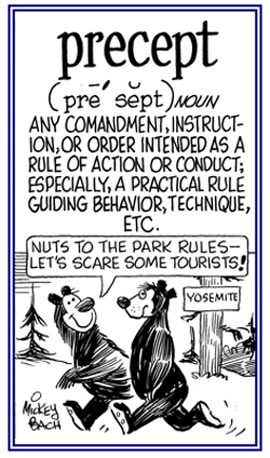cap-, cip-, capt-, cept-, ceive, -ceipt, -ceit, -cipient
(Latin: catch, seize, take, take hold of, receive, contain, hold; caught, taken prisoner)
Don't confuse the words in this cap-, cip- unit with those in the capit-, capt-, "head; leader, chief", or "first" unit of words.
A fisherman or a catcher of fish: "There are many men in the world who are piscicapturists as a profession or just for the sport of doing it."
1. A rule, instruction, or principle that guides someone's action, especially something which sets standards for moral behavior or conduct: Some people act in accordance with the precept that their proper objectives determine how they should proceed with whatever they are striving to accomplish.
2. Etymology: from Latin praeceptum, "maxim, rule, order"; from praecipere, "to take before, to give rules to, to order, to anticipate"; from prae-, "before" + capere, "to take."

© ALL rights are reserved.

© ALL rights are reserved.
Go to this Word A Day Revisited Index
2. Etymology: from Latin praeceptum, "maxim, rule, order"; from praecipere, "to take before, to give rules to, to order, to anticipate"; from prae-, "before" + capere, "to take."


Go to this Word A Day Revisited Index
so you can see more of Mickey Bach's cartoons.
1. A teacher or an instructor, especially at a university or college: Mr. Mark Stevens was a preceptor of biology at the educational institution that Tom was attending.
2. Etymology: from Latin pracceptor from praccept, "warned, instructed" from the verb praccipere, "to give rules to, to order, to teach"; from prae-, "before" + capere "to take."

© ALL rights are reserved.
Go to this Word A Day Revisited Index
2. Etymology: from Latin pracceptor from praccept, "warned, instructed" from the verb praccipere, "to give rules to, to order, to teach"; from prae-, "before" + capere "to take."

Go to this Word A Day Revisited Index
so you can see more of Mickey Bach's cartoons.
preceptorial (adjective); more preceptorial, most preceptorial
1. Referring to or relating to a physician who gives practical training to a medical student: The retired doctor, who had helped the students become familiar with the difficulties of their chosen profession, was the most important preceptorial instructor the students had ever had.
2. Relating generally to a tutor or an instructor: To supplement his scholarship, Davis applied for a preceptorial position in the history department at his college.
3. Etymology: from Latin praeceptor, from praecep, "warned, instructed", from the verb praecipere, precipere, "to warn, to instruct"; from prae, pre, "before" + capere, "to take".
2. Relating generally to a tutor or an instructor: To supplement his scholarship, Davis applied for a preceptorial position in the history department at his college.
3. Etymology: from Latin praeceptor, from praecep, "warned, instructed", from the verb praecipere, precipere, "to warn, to instruct"; from prae, pre, "before" + capere, "to take".
preceptorially (adverb); more preceptorially, most preceptorially
Referring to how something is done or carried out in a manner like a teacher, head of a school department, etc.: Harrison strolled preceptorially across the campus, enjoying his status as a senior instructor at the boys' school.
A period of practical experience and training for a student, especially someone who is in medicine or nursing and who is supervised by an expert or specialist in a particular field: Hector, the resident completing his preceptorship in the dermatology department, sutured the patient's wound and was watched over carefully by the head surgeon.
1. A woman who is an instructor, teacher, or a tutor especially at an institution of higher learning: Agatha was pleased with her promotion to the position of preceptress at the exclusive women's university.
2. A woman who is the head or principal of a school: The sign on the list of distinguished persons read: Mrs. Johnson, preceptress (1919 - 1925).
2. A woman who is the head or principal of a school: The sign on the list of distinguished persons read: Mrs. Johnson, preceptress (1919 - 1925).
preconceive (verb), preconceives; preconceived; preconceiving
1. To form an opinion about something in advance: Mrs. Timmons conceptualised or preconceived ideas how to raise her children, even before she had any herself!
2. To form a premature notion or idea before possessing full or adequate knowledge or experience about it: David thought that his wife was preconceiving a life of leisure after giving birth to her first baby before knowing the real facts about baby care!
3. Etymology: from Latin concipere; from pre, "before" + capere, "to take".
2. To form a premature notion or idea before possessing full or adequate knowledge or experience about it: David thought that his wife was preconceiving a life of leisure after giving birth to her first baby before knowing the real facts about baby care!
3. Etymology: from Latin concipere; from pre, "before" + capere, "to take".
preconceived (adjective) (not comparable)
1. A reference to an idea or opinion that has been formed beforehand, especially without evidence or as a result of previous judgement: Mrs. Snow had preconceived notions about teenagers being superficial, listening to rock music, and staying out the whole night!
2. Descriptive of something that is formed in the mind in advance, particularly if it is based on little or no information or experience and reflecting personal beliefs: Jack was very prejudiced about dogs and therefore had preconceived ideas that they always barked loudly during the night and smelled bad!
2. Descriptive of something that is formed in the mind in advance, particularly if it is based on little or no information or experience and reflecting personal beliefs: Jack was very prejudiced about dogs and therefore had preconceived ideas that they always barked loudly during the night and smelled bad!
1. A conviction acquired before gaining satisfactory evidence: The preconception Mrs. Jones had of jazz being awful was based on bias and intolerance, because she only liked listening to classical music.
2. A prejudice that prevents rational consideration of an issue: Little Tommy had preconceptions about eating vegetables believing that they didn't taste good because he only liked eating burgers and chips!
2. A prejudice that prevents rational consideration of an issue: Little Tommy had preconceptions about eating vegetables believing that they didn't taste good because he only liked eating burgers and chips!
preoccupied (adjective), more preoccupied, most preoccupied
1. A reference to a person who is absorbed or is thinking a lot about someone or something else: Mary is a preoccupied secretary who is focused more on finishing her assignment than she is of taking time to eat her lunch.
2. Etymology: from Latin praeoccupare "to seize beforehand" from prae-, "before" + occupare, "to take a hold of."

© ALL rights are reserved.
Go to this Word A Day Revisited Index
2. Etymology: from Latin praeoccupare "to seize beforehand" from prae-, "before" + occupare, "to take a hold of."

Go to this Word A Day Revisited Index
so you can see more of Mickey Bach's cartoons.
1. A male member of a royal family other than the monarch, especially a son of the monarch.
2. A man who is a ruler of a principality.
3. A hereditary male ruler; a king.
4. A nobleman of varying status or rank.
5. An outstanding man, especially in a particular group or class.
6. Etymology: from Latin princeps, principis, "first, chief"; literally, "that takes first", from primus, "first" + root of capere, "to take".
2. A man who is a ruler of a principality.
3. A hereditary male ruler; a king.
4. A nobleman of varying status or rank.
5. An outstanding man, especially in a particular group or class.
6. Etymology: from Latin princeps, principis, "first, chief"; literally, "that takes first", from primus, "first" + root of capere, "to take".
princely (adjective), more princely, most princely
1. Relating to, belonging to, or suitable for a prince.
2. Of or relating to a prince; royal.
3. Generous as an amount of money, or requiring the expenditure of large sums of money: "They donated a princely sum to the charity."
2. Of or relating to a prince; royal.
3. Generous as an amount of money, or requiring the expenditure of large sums of money: "They donated a princely sum to the charity."


